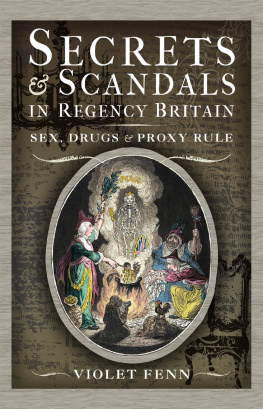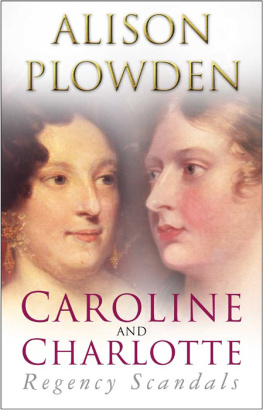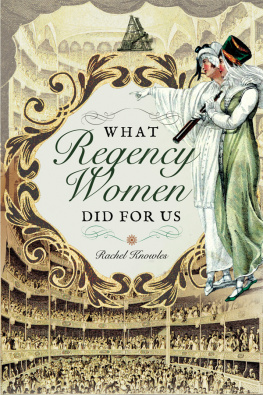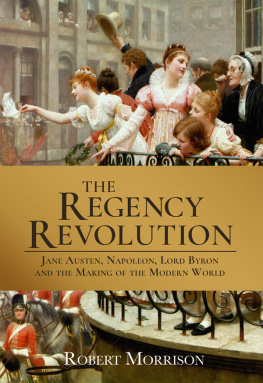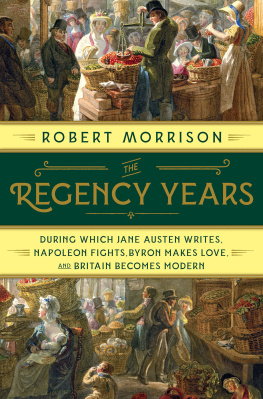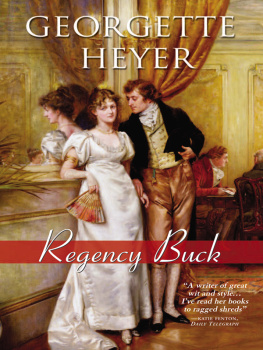Pagebreaks of the print version

Secrets and Scandals in Regency Britain
Secrets and Scandals in Regency Britain
Sex, Drugs and Proxy Rule
Violet Fenn
First published in Great Britain in 2022 by
Pen & Sword History
An imprint of
Pen & Sword Books Ltd
Yorkshire Philadelphia
Copyright Violet Fenn 2022
ISBN 978 1 39900 426 8
ePUB ISBN 978 1 39900 427 5
mobi ISBN 978 1 39900 427 5
The right of Violet Fenn to be identified as Author of this work has been asserted by her in accordance with the Copyright, Designs and Patents Act 1988.
A CIP catalogue record for this book is available from the British Library.
All rights reserved. No part of this book may be reproduced or transmitted in any form or by any means, electronic or mechanical including photocopying, recording or by any information storage and retrieval system, without permission from the Publisher in writing.
Pen & Sword Books Limited incorporates the imprints of Atlas, Archaeology, Aviation, Discovery, Family History, Fiction, History, Maritime, Military, Military Classics, Politics, Select, Transport, True Crime, Air World, Frontline Publishing, Leo Cooper, Remember When, Seaforth Publishing, The Praetorian Press, Wharncliffe Local History, Wharncliffe Transport, Wharncliffe True Crime and White Owl.
For a complete list of Pen & Sword titles please contact
PEN & SWORD BOOKS LIMITED
47 Church Street, Barnsley, South Yorkshire, S70 2AS, England
E-mail:
Website: www.pen-and-sword.co.uk
Or
PEN AND SWORD BOOKS
1950 Lawrence Rd, Havertown, PA 19083, USA
E-mail:
Website: www.penandswordbooks.com
This book is dedicated to
an unknown Scottish girl who
died aboard the Lady Juliana in 1789.
And also to the memory of Boo,
who always listened. And
always understood.
Acknowledgements
Id like to take this opportunity to thank the following people, without whom this book genuinely wouldnt exist:
Li Zakovics, who is, quite literally, the only reason Im still sane; Gill Hoffs, for endless moral support and background cheerleading; Jo Austin, Myles Clarke and Silas, for their excellent detective work on the subject of Londons confusingly renamed streets; Jay mme, for being a living, breathing inspiration; Winston Gomez; Rachael Lucas, the Queen of Mindboggling Gossip; Sam Cleasby; Suzy Cavill; Lucy Chamberlain; Ruth Douglas; Sarah Wallace; Ricky Balshaw, my own personal scapegoat. If Ive got anything wrong in these pages, its entirely his fault.
Scott Wheeldon, my baby brother and partner-in-crime; Speedy Nan, who died just as I finished writing this book, having been a constant force in my life for more than fifty years; Mum and Pete, without whom, etc etc.
Eternal thanks to editor-extraordinaire Karyn Burnham, who is somehow still speaking to me. Also Claire Hopkins, Laura Hirst and all at Pen & Sword Books for their endless help and support.
Biggest thanks and appreciation as always goes to my beloved boys Jaime and Oscar, for coping with me turning absolutely feral whenever a deadline is approaching and, well, just for being there. I love you.
Introduction
I n its most literal interpretation, the period known as the Regency lasted a mere nine years, from 1811, when George, Prince Regent, assumed power from his father to 1820, when King George III died and the Prince Regent himself became monarch. In reality, the Regency period had its beginnings in 1788, when King George first began to show signs of mental illness.
Known primarily for losing both the American colonies (during the American Wars of Independence between 17751783) and his mind, King George III has often been dismissed as a comedy character who thought more about farming than of governance. This view diminishes his many other intellectual achievements, including establishing both the Kings Library (now housed in the British Library at St Pancras, London) and the world famous Royal Academy of Arts on Piccadilly. However by the late 1780s it became impossible to ignore the fact that the kings faculties were not what they ought to be (although his health wouldnt go into terminal decline until the death of his youngest child, Princess Amelia, in 1810). King George III was the first of the Hanoverian monarchs to have been born in Britain and the first to speak English as his first language, so its rather sad that his achievements have often been overshadowed in the history books by his periods of supposed madness (the causes of which have never been definitively established).
William Pitt was elected Prime Minister of Great Britain in 1783 and again in 1804. Often known as the Younger, to differentiate him from his father William Pitt, 1st Earl of Chatham, who had also held the role of Prime Minister during the mid-eighteenth century, Pitt was a mere 24 years old when he first came to power. King Georges diminishing faculties were a golden opportunity for Pitt to take stronger control of the country, but at the same time, the situation held grave risk. It was clear that the king was unlikely to be able to retain full monarchal duties and Pitt needed a Regent on the throne in order to move the country forward. At this point in history a Prime Ministers role was tied so closely with that of the ruling monarch that should the incumbent king or queen die or otherwise relinquish their power, the PM was expected to leave with them and another be elected in their place. Pitt might have wanted King George out, but he wasnt planning to leave alongside his monarch. Luckily for Pitt, the first Regency Crisis resolved itself when King George recovered his health enough to carry on as monarch, at least for the time being.
When he was eventually put in charge, the Prince Regent was, as expected, mostly disinclined towards putting any real effort into ruling the country, and happy enough to leave most of the work to his government. Always preferring parties to principles, Prinny seems to have viewed his role as regent as irksome, if not entirely unwanted. In essence, he wanted the power and wealth that ruling a powerful country brought with it, but didnt see any reason why he should have to work for the privilege. His was a boisterous court, which included such notorious society characters as Beau Brummell, who put as much effort into carousing as he did into refining his reputation as the epitome of the dandy.
During the Regency period, the overcrowded and unhygienic slums of London and other developing cities grew apace, as their population increased faster than the supporting infrastructure. Many became known as rookeries, in reference to the way people lived jammed together like so many birds in a tree. Despite the rivers Fleet and Walbrook having been covered over and transformed into sewers, London was still half a century away from civil engineer Joseph Bazalgettes efficient sewerage system, which opened in 1865. At the beginning of the nineteenth century, raw human effluent alongside waste from slaughterhouses and fish markets was still regularly washed out into the streets and left to run down into the Thames.
Further north, by 1801, Liverpools population was nearing 80,000 sixteen times that of a mere century earlier. As the docks rapidly expanded and trade increased, so did the number of people working in the industry. Overcrowding and lack of basic facilities led to major health and social issues in most towns and cities, as people looking for work moved into the new bases of developing industry.

